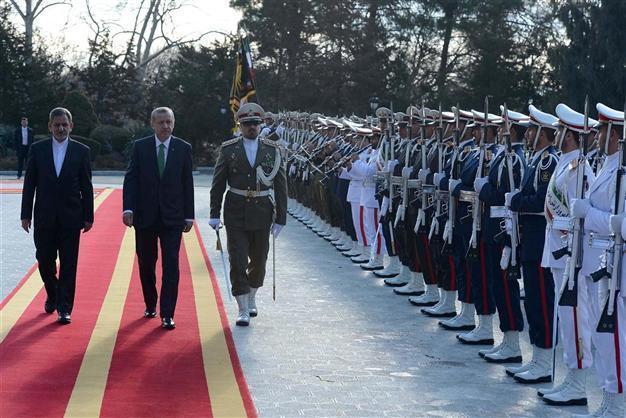Turkey, Iran to establish high level cooperation council during Erdoğan's Tehran visit
ANKARA

Prime Minister Recep Tayyip Erdoğan is received by the Iranian Vice President Isaac Jihangiri in Tehran, Jan. 29. AA photo
Turkish Prime Minister Recep Tayyip Erdoğan departed for Tehran Jan. 28 for his first meeting with Iranian President Hassan Rouhani. Turkey and Iran will sign an agreement to establish a high-level cooperation council during the visit, after Western countries eased sanctions on Tehran over an interim nuclear deal.Paying a two day visit to Tehran, Erdoğan will hold talks with Rouhani, First Vice President Eshaq Jahangiri, and the religious leader Ayatollah Ali Khamanei. He will also deliver a speech at the international institute of the Iranian Foreign Ministry. According to Iran’s Foreign Ministry, a visit to Turkey by President Hassan Rouhani will also be on the agenda. Spokeswoman Marzihe Afkham described the visit as “very important.”
“Dialogue and contacts have entered a new phase, and we hope this trend continues. Besides serving the interests of the two countries, we hope [our dialogue] will serve the interests of the region as well,” Afkham said. Energy-hungry Turkey is planning to increase oil and gas imports from Tehran after the gradual lifting of sanctions on the Islamic republic’s energy sector after an interim nuke deal with the West.
However, a visiting U.S. official warned Ankara that companies should hold off making new business with Iran.
“Iran is not open for business … Businesses interested in engaging in Iran really should hold off. The day may come when Iran is open for business, but the day is not today,” David Cohen, the U.S. secretary for terrorism and financial intelligence, told reporters on Jan. 27. He was in Ankara for discussions at the Foreign Ministry on the implementation of the Joint Plan of Action (JPOA), which was agreed on by the P5+1, the European Union and Iran.
Syria messages
“What we are working toward is the possibility of a long-term, comprehensive resolution with the Iranians in which they demonstrate that their nuclear program is exclusively for peaceful purposes,” Cohen added.
Meanwhile, Erdoğan yesterday delivered messages on developments in Syria ahead of his trip, harshly criticizing the international community for its “inaction” on the regime’s “brutality against civilians.” Ankara will maintain its “humanitarian policies” on Syria, Erdoğan said, adding that Turkey’s attitude on Syria would “make history.”
“We’ll continue to defend the rights of the oppressed, despite all pressure and all sabotages,” he said, addressing his parliamentary group. “We’ll continue to carry aid to the oppressed [in Syria], as a responsibility of being a great state, despite some staging treacherous sabotages … Syria faces a heavy examination. As brothers of Syria, we will also put our stamp on history through our own examination,” Erdoğan added.
















